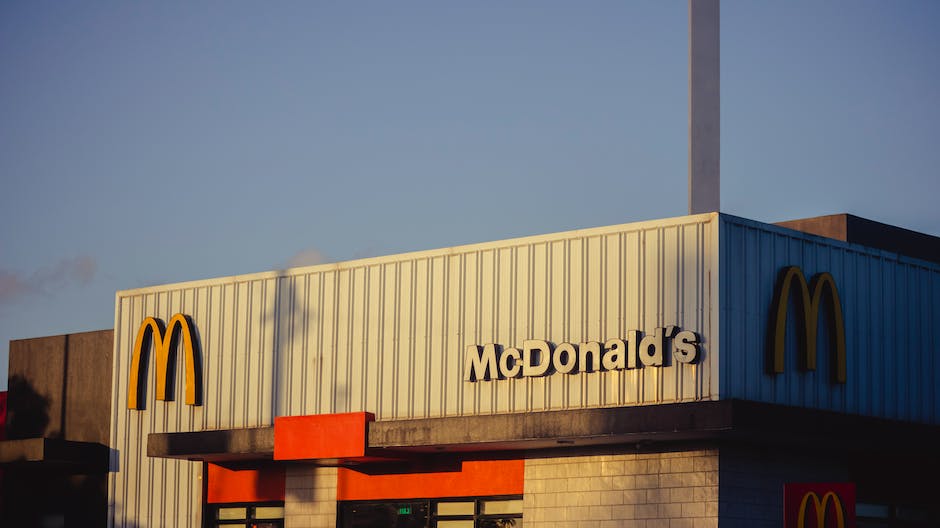In the vibrant tapestry of the United Kingdom’s food and beverage industry, one chain that has woven itself into the hearts and appetites of British patrons is McDonald’s. From its inaugural outlet that unassumingly sprouted in Woolwich, London in 1974, to hundreds of outlets today, each adorned with its iconic golden arches, McDonald’s has become a beloved staple in the UK’s fast-food diet. The saga of McDonald’s in the UK is not simply one of globalisation, but a narrative of adaptation, resilience, and keen business acumen. This journey will explore the intricacies of the fast-food giant, showing how it has tailored its palate to delight British taste buds, launched significant sustainability initiatives and created an indelible imprint on the UK economy.
History of McDonald’s in the UK
Establishment of the First McDonald’s in the UK
In 1974, McDonald’s landed on British soil, opening the first UK restaurant in the borough of Woolwich, South London. This marked the entry of the global fast-food giant into the British market.
Early Years and Public Reception
In its early years, McDonald’s in the UK faced steep competition from established British restaurants and fast-food outlets. But the brand stayed true to its American roots and continued to design its menu and services around a fast, reliable, and convenient customer experience.
Despite the initial culture clash, Britons gradually embraced McDonald’s American-style fast food. The ‘Big Mac’ and ‘Chicken McNuggets’ especially, became familiar and favourite menu items. Consumer acceptance was facilitated in part by McDonald’s commitment to source ingredients locally, reassuring British customers of the quality of their food.
Growth and Expansion
Over time, McDonald’s has grown to become a dominant player in the UK fast food industry. As of 2021, there are over 1,300 McDonald’s restaurants across the UK, serving millions of customers each day. Its growth has been propelled by the opening of new restaurants in strategic locations, menu innovation, adoption of digital technology, and investment in store refurbishments.
Key Milestones and Strategic Initiatives
McDonald’s West End branch, which opened in 1986, became its biggest branch in the world at that time. This marked a significant milestone in the company’s UK journey.
In the 1990’s, McDonald’s introduced its first vegetarian product, the Vegetable Deluxe, signalling a shift towards catering for a wider range of dietary needs and preferences.
In 2006, McDonald’s in the UK committed to use 100% British and Irish beef and free-range eggs, projecting itself as an advocate for local farmers and sustainable agriculture. In 2007, they introduced healthier options for children’s Happy Meals, reducing salt and sugar levels.
With the advent of digital technology, McDonald’s launched mobile ordering and payment options, installed touch-screen kiosks for ordering and introduced table service in 2015, greatly enhancing customer convenience.
In 2018, McDonald’s in the UK announced plans to replace all plastic straws with paper ones, showing commitment to reducing environmental impact. It also started offering ‘Happy Meals’ with a book or toy option, promoting reading among children.
The Present Landscape and Notable Progress
With a deep-seated presence in the UK, McDonald’s has consistently remained a favourite fast-food brand amongst the British populace. It has shown agility in anticipating and adapting to the shifting consumer trends, creating vegan alternatives being a case in point. Its popularity is palpable in the frequently spotted long queues at their drive-thru windows, a phenomenon that has seen a surge since the COVID-19 pandemic intensified the demand for takeaway and contactless dining services.
In 2020, McDonald’s marked the 45th year since its first restaurant opened in the UK. Despite the hardship brought on by the pandemic, the fast-food giant has demonstrated remarkable resilience and adaptability, continuing to serve its UK customers via its physical outlets and delivery partners.
In essence, McDonald’s has grown and evolved to become an integral part of the daily British life.

Menu Customisation to Suit UK Preferences
McDonald’s UK – A Global Brand with a Local Flavour
McDonald’s, an international fast-food leader, has successfully culminated a unique blend of global and local, modifying its menu to reflect the regional taste and preferences of the UK.
The annual ‘Great Tastes of America’ promotion stands as a prime example of the brand’s localised approach. The campaign, running for a limited time, saw the introduction of a variety of American state-inspired burgers, each tailored to satiate the British taste buds. Innovations included items such as ‘The Alabama Chicken’ and ‘The South Carolina Stack’, with distinct flavour profiles that captivated the British audience.
In addition to presenting American tastes, McDonald’s UK also paid homage to international flavours through its ‘Great Tastes of the World’ promotion. This campaign spotlighted a diverse range of burgers and wraps, each echoing flavours from different corners of the world. Highlights of the promotion included ‘The Italian Stack’ slathered with rich tomato relish, the ‘Swiss Stack’ layered with creamy Emmental cheese sauce, and the ‘French Stack’ spread with a punchy garlic mayonnaise, and other such global offerings.
Adapting to Health Trends: McDonald’s UK Healthier Options
Adaptable in responding to changing consumer demands, McDonald’s UK has diversified its menu to offer healthier options. Known for its calorific burgers and fries, McDonald’s has incorporated options like the ‘Grilled Chicken Salad’, ‘Fruit Bag’, and ‘Carrot Sticks’ in a bid to cater to a growing health-conscious demographic. An example is the ‘McPlant’, a plant-based burger, catering to the increasing vegetarian and vegan population in the UK.
McDonald’s UK Breakfast Menu Changes
McDonald’s UK has not only adapted day meal options, but also the breakfast menu. The traditional American hotcakes with syrup and sausage were replaced with bacon rolls, quinoa porridge and bagels to cater to the traditional British morning meal preferences.
When Fan-favourites get discontinued
However, not all adaptation strategies have met with success. There have been instances when McDonald’s UK had to discontinue items due to the lack of popularity or feasibility issues. For example, despite its initial success, the ‘Supreme Burger’ range was discontinued due to an oversaturation of premium-priced items. Similarly, the ‘Big Tasty’, a crowd favourite, was taken off the regular menu and is only offered during promotional periods.
Wooden Utensils: Sustainability Initiatives
In line with increasing awareness towards sustainability and a drive towards reducing plastic waste, McDonald’s UK replaced plastic straws with paper ones. Furthermore, it transitioned to wooden cutlery for its salad and sundae ranges, while plastic Happy Meal toys have been replaced with book options or toys made from recyclable materials.
Localised Menu: A Business Strategy
McDonald’s fascinating global strategy of ‘think global, act local’ is significantly exemplified by their adaptation of region-specific menus. The primary business motive behind such customisations is to enhance customer loyalty and trigger a boost in sales, cultivating long-term business expansion in respective markets. This initiative, furthermore, boosts their brand identity that endorses inclusivity, accessibility and a customer-centric approach.
McDonald’s evolving strategy, aligning with the rising health and sustainability trend, is a smart response to the fluctuating consumer preferences. Incorporating healthier alternatives in their menu has not only added a new segment of customers but has also helped polish its public image.
The constant cycle of assessment, introduction, and discontinuation of menu items reflects McDonald’s adaptable and dynamic business model, with a spotlight on customer contentment. Such timely updates are crucial in the fast-paced fast-food industry, where monotony can result in a decreasing customer interest and consequently, sales.

Corporate Social Responsibility and Sustainability Initiatives
Sustainability Initiatives by McDonald’s UK
Striding towards environmental sustainability, McDonald’s UK has made remarkable alterations to its operational strategy. The fast-food giant is intent on minimising its carbon footprint and energy consumption, harnessing renewable resources and boosting waste recycling. Collaborations with environmental specialists and partners have led to the development of efficient sustainability solutions at McDonald’s UK. Consequently, the changes witnessed include introduction of energy-efficient kitchen appliances, LEDs as a lighting solution, waste segregation at recycling points and the innovative initiative of converting used cooking oil to biodiesel, fuelling their delivery vehicles.
McDonald’s UK Charitable Activities
The Ronald McDonald House Charities (RMHC), the company’s primary global philanthropic initiative is also active in the UK. The charity offers free accommodation to families with children receiving hospital treatment. There are currently fourteen Ronald McDonald Houses in the UK, each located near a specialist children’s hospital. Since its inception in 1989, over 50,000 families have benefited from staying at a Ronald McDonald House in the UK while their children received care.
Additionally, McDonald’s UK, along with their franchisees and suppliers, host annual fundraising events for RMHC, which include family fun days, golf tournaments, gala dinners, and participation in sponsored runs.
Community Engagement in McDonald’s UK
Community involvement is an integral part of McDonald’s UK’s operations. The company runs numerous campaigns and events aimed at giving back to the local communities where they operate. Among these are the ‘Football Mum of the Year’ an initiative to recognise the contributions of mothers in local grassroots football.
In recent times, McDonald’s UK initiated the ‘Happy Readers’ programme, with the aim of fostering a love of reading in children. The initiative, backed by the National Literary Trust, has seen more than 70 million books being distributed through McDonald’s Happy Meals.
The Influence and Significance of McDonald’s UK
McDonald’s UK shows an impressive commitment to corporate social responsibility, with its determined efforts towards sustainability, charity and community engagement. Its significant contributions towards current issues like environmental sustainability, community support and literacy underscores their dedication beyond their fundamental role as a fast-food chain. These ongoing initiatives strengthen their reputation within the UK as a corporate entity that values more than just their profit margins.

Economic Impact and Employment
McDonald’s UK: A Vital Contributor to Employment
With its extensive presence across the breadth of the UK, McDonald’s provides a vast range of employment opportunities. Boasting over 1,300 restaurants nationwide, McDonald’s employs in excess of 120,000 individuals in a multitude of roles, spanning from restaurant crew members to corporate roles. Astonishingly, one in every 300 people working in the UK is employed by McDonald’s. This statistic underscores the fundamental role that the company plays within the UK job market, offering many their initial work experience, the opportunity to develop skills, and earn a wage.
Engaging with Local Suppliers
Beyond providing employment opportunities, McDonald’s UK has an extensive network of local suppliers. It remains committed to sourcing as many ingredients as possible from the UK. This includes 100% British and Irish beef, free range eggs, RSPCA Assured pork, organic milk, and sustainably sourced fish. By procuring locally, McDonald’s UK supports local farmers as well as the wider agricultural and fishing industries that make up a significant proportion of the UK economy.
Taxes Contribute to Wider Economy
McDonald’s UK fiscal responsibilities also contribute significantly to the UK economy. Through the payment of business taxes, employee taxes, and other financial obligations, McDonald’s UK contributes heavily to the UK’s public coffers. The company’s economic contribution extends beyond the direct employment and supplier level, forging essential fiscal ties with the UK economy.
Business Success for McDonald’s
From a business perspective, McDonald’s UK success is notable. The combination of its employment reach, local sourcing practices, and tax contributions not only impacts the UK economy, but builds its reputation as a responsible corporate citizen that bolsters customer trust and loyalty. This reputation, in turn, drives profitability. The sustained popularity of McDonald’s in the UK reflects the success of this business model.
Adapting to Changing Trends
McDonald’s UK continues to adapt to consumer trends, tastes, and preferences. The company has introduced healthier menu options, vegan-friendly meals, and technologically advanced services such as self-order kiosks and mobile applications. This resilience and adaptability suggest McDonald’s will continue contributing to the UK economy while remaining a popular choice amongst consumers for years to come.
Significant Role in the UK Economy
McDonald’s UK holds a prominent position not just within the fast food sector, but also within the broader economic landscape of the country. Its job creation, support for local suppliers, considerable tax contributions, and customer-focused adaptations demonstrate its substantial influence on the UK economy. Clearly, the impact of McDonald’s UK reaches far beyond just food service.

Facing Challenges and Controversies
Health Concerns and the Escalation of Obesity
However, it’s important to consider the implications of McDonald’s UK on public health, particularly with regards to the country’s escalating obesity rates. Critics argue that McDonald’s, with its menu laden with high-calorie, high-sugar, and high-fat offerings, promotes unhealthy eating habits. This sentiment is echoed by reputable health bodies such as the British Heart Foundation, who have raised concerns about the health consequences of regular fast food consumption.
Labour Rights Controversy
McDonald’s in the UK has been at the centre of labour rights controversies for several years. Workers protested against low wages, zero-hours contracts, and poor working conditions, leading to strikes across the country. As a result, the company announced in April 2017 that it would offer workers the choice between zero-hours contracts and fixed hours. The company has been working towards establishing a better relationship with its employees, including giving them the right to form a trade union.
McLibel: The Longest Trial in English History
The longest civil trial in English legal history has been the ‘McLibel case’, in which McDonald’s sued environmental activists Helen Steel and David Morris over a pamphlet critical of the company. After a ten-year legal battle, the European Court of Human Rights ruled that the original trial had not been fair, due to the UK’s libel laws, thereby marking a significant moment for freedom of speech in the country.
Plastic Pollution and Waste Management
McDonald’s in the UK has also faced criticism for its contribution to plastic pollution. Plastic straws, drink lids, and Happy Meal toys have all drawn negative attention. In response, McDonald’s has implemented several changes such as replacing plastic straws with paper ones and offering soft toys, books, or board games as an alternative to plastic Happy Meal toys.
Implementation of Changes
Despite the challenges and criticisms, McDonald’s has shown resilience and adaptability in the UK market. It has started to implement healthier menu options, including fruit bags, salads, and grilled chicken wraps to appeal to more health-conscious customers. The company has also shown openness to vegan and vegetarian diets by introducing the McPlant burger and Veggie dippers, reflecting the change in consumer eating habits.
COVID-19 Impact
The COVID-19 pandemic posed a unique challenge to McDonald’s in the UK. With the closure of dine-in services and increased safety protocols, the company had to rapidly adapt to ensure the safety of workers and customers. Drive-thru and delivery services were prioritized, and thorough cleanliness protocols were put in place. Despite the initial drop in sales due to the pandemic, McDonald’s has managed to recover through innovative strategies and adaptability.
Lessons Learned and Future Plans
The company continues to learn and adapt from the numerous controversies it has faced in the UK. McDonald’s has initiated several changes to improve employee rights, combat plastic pollution, and promote healthier food options. While it still faces criticism for its business practices and societal impact, McDonald’s remains a staple in UK high streets and a major player in the fast-food industry. Looking ahead, the company plans to continue its sustainability efforts and strive for better waste management systems in its outlets.

Photo by canweallgo on Unsplash
Stepping away from the direct view of the golden arches and the familiar buzz of McDonald’s, one can glimpse at the impact the fast-food behemoth has on the UK’s socio-economic landscape. Whether it’s through jobs created, supporting local suppliers, or engaging in community initiatives, McDonald’s has proven to be a player that’s far more than just fast food. Yet, it has not been an easy ride, as the company has faced its share of controversies and hurdles. These challenges, however, have been the hot oil in which McDonald’s UK has deep-fried its resilience and adaptability, showing that it isn’t just Big Macs that they excel at, but lessons in business adaptability too. As we look to the future and McDonald’s place in it, one can only expect the fast-food giant to continue mastering the menu of success in its own indomitable way.
